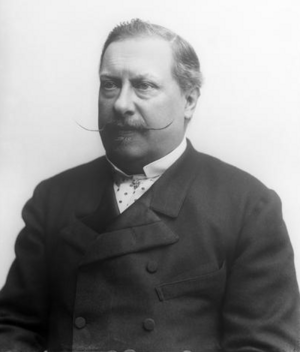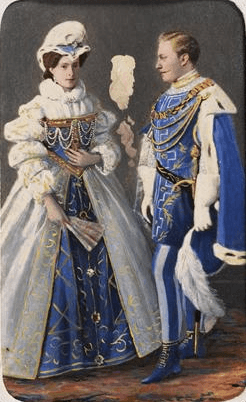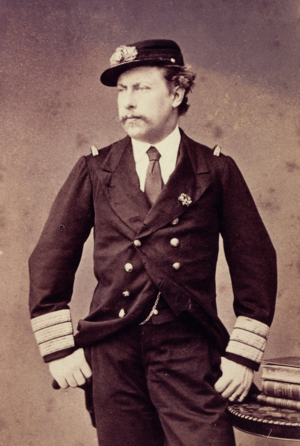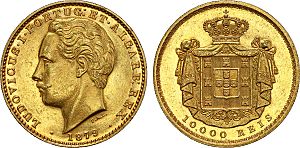Luís I of Portugal facts for kids
Quick facts for kids Luís I |
|
|---|---|

Photograph by Augusto Bobone c. 1880s
|
|
| King of Portugal | |
| Reign | 11 November 1861 – 19 October 1889 |
| Acclamation | 22 December 1861 |
| Predecessor | Pedro V |
| Successor | Carlos I |
| Prime Ministers |
See list
The Duke of Loulé
The Marquis of Sá da Bandeira Joaquim António de Aguiar The Duke of Ávila and Bolama The Duke of Saldanha Fontes Pereira de Melo Anselmo José Braamcamp António Rodrigues Sampaio José Luciano de Castro |
| Born | Luís Filipe Maria Fernando Pedro de Alcântara António Miguel Rafael Gabriel Gonzaga Xavier Francisco de Assis João Augusto Júlio Valfando de Bragança-Saxe-Coburgo e Gota 31 October 1838 Necessidades Palace, Lisbon, Portugal |
| Died | 19 October 1889 (aged 50) Citadel Palace, Cascais, Portugal |
| Burial | Pantheon of the Braganzas |
| Spouse |
Maria Pia of Savoy
(m. 1862) |
| Issue |
|
| House | Braganza |
| Father | Ferdinand of Saxe-Coburg and Gotha |
| Mother | Maria II of Portugal |
| Religion | Roman Catholicism |
| Signature | |
Dom Luís I (born 31 October 1838 – died 19 October 1889), also known as the Popular, was the King of Portugal from 1861 to 1889. He was the second son of Queen Maria II and King Ferdinand. Luís became king after his older brother, King Pedro V, passed away. He belonged to the House of Braganza, a royal family.
Contents
King Luís I's Time as Ruler
King Luís was a well-educated person who enjoyed writing poetry. However, he wasn't naturally skilled in politics. He became king unexpectedly when his older brother, Pedro V, died in 1861.
During Luís's reign, Portugal had a system of changing governments called Rotativism. This meant that different political parties, the Progressistas (Liberals) and the Regeneradores (Conservatives), took turns leading the country. King Luís often favored the Regeneradores, helping them stay in power for a long time after 1881.
Even though Portugal had some political changes, the country didn't make much progress compared to other Western European nations. There were challenges in public education, political stability, new technologies, and the economy.
In terms of Portugal's colonies, Delagoa Bay was officially recognized as a Portuguese territory in 1875. However, Portugal faced difficulties expanding its empire in Africa. Activities by Belgium in the Congo and a strong warning from Britain in 1890 stopped Portugal from connecting its colonies of Portuguese Angola and Portuguese Mozambique. This happened during a time when European countries were competing to claim lands in Africa, known as the Scramble for Africa.
King Luís I's Hobbies and Interests
Luís I loved literature and enjoyed reading books in both Portuguese and English. He was the first person to bring complete translations of William Shakespeare's plays to Portugal. Some of the plays he helped translate include The Merchant of Venice, Richard III, and Othello, the Moor of Venice. His most famous translation in Portugal was Hamlet.
Marriage and Family Life
In June 1862, King Luís needed to get married quickly. His older brother, King Pedro V, had died without children in November 1861. Two of Luís's younger brothers, João and Fernando, also passed away soon after. This meant the Braganza royal family had very few heirs left.
Luís considered several princesses for marriage. He even asked Archduchess Maria Theresa of Austria to marry him, but her father felt she was too young. Just two weeks later, Luís asked for the hand of Princess Maria Pia of Savoy. This time, his proposal was accepted, even though Maria Pia was younger than Maria Theresa.
Luís married Maria Pia, who was the daughter of Victor Emmanuel II of Italy, on 6 October 1862. They had two sons who grew up to be adults:
- Dom Carlos, Prince Royal of Portugal (born 28 September 1863 – died 1 February 1908). He became King Carlos I after his father. Sadly, he was murdered.
- Dom Afonso, Prince Royal of Portugal (born 31 July 1865 – died 21 February 1920). He was an Infante of Portugal and Duke of Porto. Later, he became Viceroy of India and, after 1908, Prince Royal.
- They also had a Miscarriage in 1866.
See also
 In Spanish: Luis I de Portugal para niños
In Spanish: Luis I de Portugal para niños
 | Aurelia Browder |
 | Nannie Helen Burroughs |
 | Michelle Alexander |




